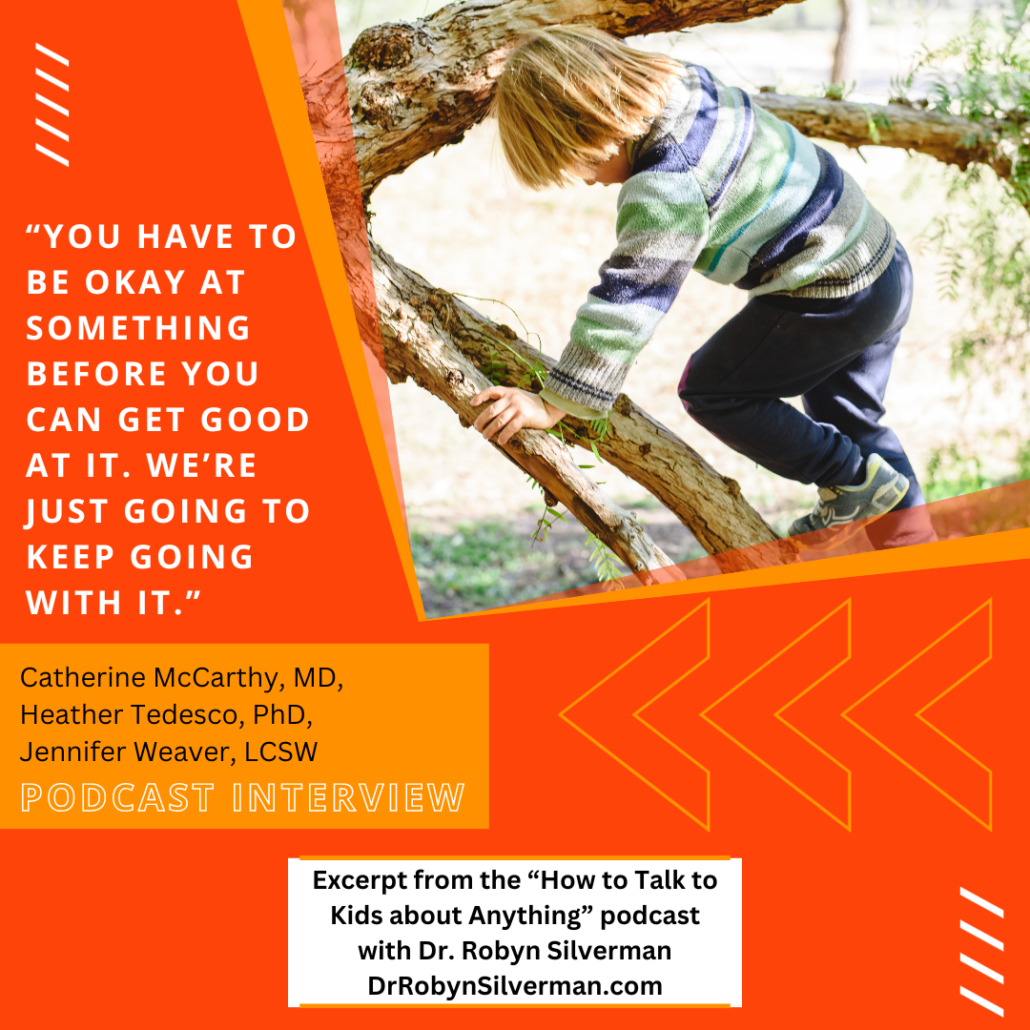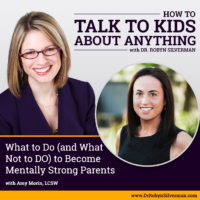Podcast: Play in new window | Download
Subscribe: Apple Podcasts | RSS | More
How to Raise a Kid Who Can

Raising an independent and strong-willed kid can be incredibly rewarding and empowering for both you and your child. In this podcast, we’ll share practical tips, expert advice, and real-life stories from parents who have been there, navigating the twists and turns of raising strong-willed children. Together, we’ll explore strategies for fostering independence, building resilience, and nurturing a positive parent-child relationship.
Guest Expert: Catherine McCarthy, MD, Heather Tedesco, PhD, and Jennifer Weaver, LCSW
Intro:
The world today can feel overwhelming- complicated, overloaded, moving at the warp speed! What do kids need to thrive—so that they catch their breath before facing the next hurdle, cope gracefully with the ups and downs of life and bend not break? My next guests provide 10 essential, actionable strategies that we can use to raise kids who can. Who can roll with punches, connect, deal with frustration, bounce back and ultimately thrive. For this, we will be talking to my new friends, Catherine, Heather and Jennifer.
speed! What do kids need to thrive—so that they catch their breath before facing the next hurdle, cope gracefully with the ups and downs of life and bend not break? My next guests provide 10 essential, actionable strategies that we can use to raise kids who can. Who can roll with punches, connect, deal with frustration, bounce back and ultimately thrive. For this, we will be talking to my new friends, Catherine, Heather and Jennifer.
Bio:
CATHERINE MCCARTHY, MD, is a Duke trained child and adolescent psychiatrist with nearly 25 years of clinical experience.
HEATHER TEDESCO, PhD, a licensed applied psychologist with a PhD in social psychology, works exclusively with parents in her practice.
JENNIFER WEAVER, LCSW, has been named one of the “Best Child Therapists” by Washingtonian magazine.
What a team they make!
Important messages:
- Growing your attention and self-control: 1st Step- Tune in and know where you actually are. 2nd Step: Acceptance.
- Developing Self-control: You got to expect to struggle sometimes and not be derailed and surprised by it. That’s just part of it too. Looking back and remembering the consequences in the past and being able to see yourself in the future and stretching those things in both directions develop self-control.
- Helping kids start engaging with their future self-thinking: Depends on age is but in general just give them responsibilities and visuals on the things that need to be accomplished.
- Normalize to our kids that not everything should be instantly enjoyable, fun, and can happen.
- Delayed gratification rewards that take necessarily a long time to achieve, but are so deeply fulfilling when we get there.
- Accepting and tolerating those difficult feelings: It’s okay to be bored and to hate doing something and to still do it.
- Teaching confidence: When kids feel capable they gain the confidence and they gain the confidence of seeing how they can do something when they see the results and then that feels good. We need them to mess up and get back up.
- Letting go of the old messages: “If there’s something worth doing, it’s worth doing well.” That’s a very important idea, but it’s not always true. It gets in the way of some of these kids with their more perfectionistic tendencies. They don’t want to do things because they know they won’t do them well.
- It is okay to get AB minus on some things around, whether it’s sorting socks or, or changing your oil for the first time.
- You have to be okay at something before you can get good at it. So we’re just going to keep going with it.
- Making your child feels trusted to increase motivation: If we can look at our child and sort of see the best in them and, and notice where they are a motivated, competent person, that’s step one. Because they have to feel that from us. That’s the acceptance piece we talk so much about before they’re going to be even remotely willing to, you know, entertain any of these non-intrinsically motivating things to them that we want them to do.
- Try to be curious about them and look for what lights them up and start there.
Notable quotable:
- “You got to expect to struggle sometimes and not be derailed and surprised by it.”
- “Not everything should be instantly enjoyable, fun, and can happen.”
- “It’s okay to be bored and to hate doing something and to still do it.”
- “When kids feel capable they gain the confidence and they gain the confidence of seeing how they can do something when they see the results and then that feels good. We need them to mess up and get back up.”
- “You have to be okay at something before you can get good at it. So we’re just going to keep going with it.”
- “Try to be curious about them and look for what lights them up and start there.”
Resources:
Instagram: https://www.instagram.com/akidwhocan/
Book: www.raisingakidwhocan.com








